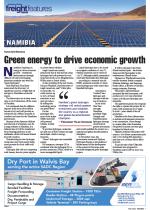Namibians have responded to a lack of opportunities in the formal sector by creating work for themselves.This has led to the establishment of logistics companies focusing on the informal sector in Namibia and then expanding into the region.One is Windhoek-based Jabu Logistics, which has developed an app and e-commerce solutions to facilitate the delivery of fast-moving consumer goods to small and informal retailers, including street vendors and restaurants.According to the company, it passes on the benefits of savings through bulk purchases to the informal traders.It offers free same-day delivery after products are ordered through a phone app.Customers pay cash on delivery. The potential of the market is identified in the introduction to the third National Youth Policy, which states: "Namibia has a dual economy, with a rapidly growing informal sector, with 66.5% of the total employed population in informal employment (67.5% women; 65.6% men). “In addition, of the total number of the urban population, 57.3% are employed in the informal sector, while 81.1% employed in the informal sector are from the rural population."The 2018 Namibian Labour Force Survey shows that more than half (57%) of the 725 742 employed people in the country at the time were in the informal sector.Jobs sustained by the informal sector have helped Namibia to halve the proportion of citizens living below the national poverty line between independence in 1990 and 2016 – when the last national census was undertaken. Children born in Namibia also have an advantage over their peers in many neighbouring states. According to the Human Capital Index (HCI), a child born in Namibia today will be 45% as productive when she grows up as she could be if she enjoyed complete education and full health. This is higher than the average for the sub-Saharan Africa region but lower than the average for upper middle income countries.

